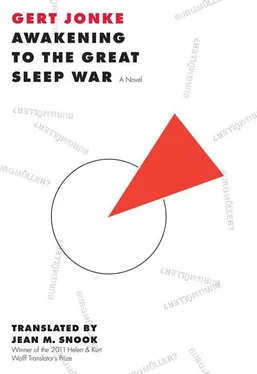Gert Jonke - Awakening to the Great Sleep War
Здесь есть возможность читать онлайн «Gert Jonke - Awakening to the Great Sleep War» весь текст электронной книги совершенно бесплатно (целиком полную версию без сокращений). В некоторых случаях можно слушать аудио, скачать через торрент в формате fb2 и присутствует краткое содержание. Год выпуска: 2012, Издательство: Dalkey Archive Press, Жанр: Современная проза, на английском языке. Описание произведения, (предисловие) а так же отзывы посетителей доступны на портале библиотеки ЛибКат.
- Название:Awakening to the Great Sleep War
- Автор:
- Издательство:Dalkey Archive Press
- Жанр:
- Год:2012
- ISBN:нет данных
- Рейтинг книги:4 / 5. Голосов: 1
-
Избранное:Добавить в избранное
- Отзывы:
-
Ваша оценка:
- 80
- 1
- 2
- 3
- 4
- 5
Awakening to the Great Sleep War: краткое содержание, описание и аннотация
Предлагаем к чтению аннотацию, описание, краткое содержание или предисловие (зависит от того, что написал сам автор книги «Awakening to the Great Sleep War»). Если вы не нашли необходимую информацию о книге — напишите в комментариях, мы постараемся отыскать её.
, is an expedition through a world in constant nervous motion, where reality is rapidly fraying — flags refuse to stick to their poles, lids sidle off of their pots, tram tracks shake their stops away like fleas, and books abandon libraries in droves. Our cicerone on this journey through the possible (and impossible) is an “acoustical decorator” by the name of Burgmüller — a poetical gentleman, the lover of three women, able to communicate with birds, and at least as philosophically minded as his author: “Everything has suddenly become so transparent that one can’t see through anything anymore.” This enormously comic — and equally melancholic — tale is perhaps Jonke’s masterwork.
Awakening to the Great Sleep War — читать онлайн бесплатно полную книгу (весь текст) целиком
Ниже представлен текст книги, разбитый по страницам. Система сохранения места последней прочитанной страницы, позволяет с удобством читать онлайн бесплатно книгу «Awakening to the Great Sleep War», без необходимости каждый раз заново искать на чём Вы остановились. Поставьте закладку, и сможете в любой момент перейти на страницу, на которой закончили чтение.
Интервал:
Закладка:
His girlfriend always had her ear pressed firmly to the kitchen door, listening intently to what was going on inside, and always thinking she’d heard something, he could see that from her face, she strained to listen to the interior, as if it were also the forbidden room of her own innermost being, forbidden even to herself; but he heard less and less, soon nothing more, even when he pressed his ear with great determination against the door, which she tried desperately to prevent him from doing, he simply heard nothing. By way of contrast, she seemed to hear something that moved her more and more deeply; it gave him the impression that secret messages were being passed to her through the locked door, messages that were explicable only to her, and were intended only for her, as if the locked door were the insuperable boundary to an entirely different, invisible, unimaginably new type of existence that had known how best to set itself up, to settle into his apartment behind his back, without asking his permission, and strictly speaking also against his will, yes, as if for her another space was beginning behind the door, a space she didn’t entirely understand yet, but which she sometimes longed to enter as she longed for nothing else, but this was impossible for her for whatever reasons, with which situation she nevertheless seemed satisfied.
What did it have to do with Elvira? Had Elvira, by turning up at the kitchen window on that November day, brought all of this about — had it all begun with Elvira, and hadn’t his girlfriend greeted the housefly that day as if she’d been waiting for it for the longest time?
Only Elvira would be in a position to understand everything completely, thought Burgmüller. . would he therefore soon consider the housefly more important than his beloved?
At first, though, he wondered if he was in some way to blame; why had she turned away to such an extent, not only from him, but also from herself? But the more he questioned her about it, in his distress, the more determined she was not to give him the slightest clue; her refusal to speak took on an increasing clarity, until her silence became an even louder form of scolding than if she had screamed at him — thus her refusal to talk about how he had hurt her feelings, which he was trying in vain to determine, became the main component of her punishment of him.
Yes, maybe he hadn’t spoken with her often enough about everything imaginable; for example, he had never spoken about his work as an interior acoustic designer, and he had always refused to do so. Why, actually? Did he think she was too unmusical, and had that cut her to the core, that he suspected she didn’t know enough about music? So he tried to make amends right away, he started giving her whole lectures about the proper setup of the acoustic spaces of the musical architecture he had conceived of over the years, he spoke of rooms as the interiors of huge instruments, of houses that sounded, buildings that, as he now explained very simply, almost as if to a child, sucked in air to produce sound, street air, city air, but along with the air they also sucked in the waves of street sounds, city sounds, that were swimming along in it, how it was then possible to take this intolerably noise-filled air from the environment and convert it in the hollow spaces of his room instruments and the chamber-music valves of his sounding buildings so that a happily moaning or excitingly calming vibration of notes would come forth from the roofs, the windows, the walls; because the occupants of the buildings, within their private musical-instrument walls, not only happened to live in their particular homes and in their part of the city, but were also, at the same time, by means of this living, in those rooms, responsible for forming the sound atmosphere of the entire city, through all of its streets, without any effort on their part, and so even the smallest street had its own assigned sound atmosphere: for example, on the narrow streets, there would be a pulsating, resounding circulatory system to accompany life at the different times of day and night in a beguiling and generally systematically supportive manner, all of this taking place thanks to and within an uninterrupted family music performance. . and Burgmüller showed his girlfriend, who was crouching silently before the kitchen door, his corresponding blueprints, but she didn’t so much as glance at them, and then he likewise showed her his rejoicing model buildings that whistled or moaned, and she ignored them too, whereupon she hurt his feelings even more insultingly with her silence, almost pelted him with it, as if she were roaring at him, she turned completely away from him, so that only her arched back was turned toward him; only in the shiny surface of the varnished kitchen door could he see the dully reflected shadows of her face.
Nevertheless, he kept trying to make up for things he hadn’t done that might be the cause of their failing relationship, maybe it wasn’t entirely too late. He even described to her, although she wasn’t listening to him, his newest project, the working out of spaces of complete silence , he patiently gave her lectures about the absence of sound , he explained total silence to her, even though it was unfortunately an impossibility, because, first, there were natural noises inside every conventional ear and it was impossible to avoid the circulation of the molecules and atoms that unfortunately were what existing matter was made of, and that presumably caused considerable, if microscopic noise, and then, second, by way of contrast, hypothetically silent matter that was built elsewhere, that didn’t have noises of its own, would hardly be perceptible by our heads, even within Burgmüller’s most silent spaces, because the body itself represented a considerable source of sound, and then he described to his girlfriend the acoustic activity of the human body and its organs, he spoke of an incessant rustling of the flesh , accompanied by the hissing of a ceaseless glandular spritz, and it was a good thing that a conventional human being didn’t normally hear the sounds of his anatomical power stations — though in that regard there were people, regrettably, who suffered from illnesses that forced them to listen to everything all the time, whose heads were almost bursting because the sense organs were no match for the burden of their own barely tolerable bodily noises — yes, Burgmüller gave his silent girlfriend a theoretical explanation of his research into silence, while she tried to crawl even farther away from him into her silence behind the locked kitchen door by holding both hands over her ears.
What could she still have against him, since he was making an effort as never before, he asked himself, she was listening to silence while he was trying to explain silence to her, but her silence seemed to captivate, so wasn’t her silence a much more substantial sound-lessness than his?
As he kept thinking about how he had neglected and failed her, it occurred to him, yes, maybe I should have taken her to concerts more often, he had only been at a concert with her once, at the time he was studying absolutely silent space, yes, and he remembered how happy she had been there, how well she had felt, what an unforgettable impression that experience had made on her, yes, he thought, maybe if I had taken her to concerts more often that would have been the solution, and he remembered how her eyes shone with expectation as they entered the concert hall, went to their seats, and sat for a long time, together with the rest of the audience, in quiet expectation, just as the orchestra on the stage waited silently for the conductor to appear, and he did come at last, was immediately greeted with thunderous applause, then he lifted his baton to indicate that he was now ready to begin, and finally the music began, yes indeed, the slow introduction to the symphony, and during the exposition of the themes of the piece, the listeners suddenly felt effortlessly calm and were soon so completely relaxed that they began to wave at each other, and there was a friendly fluttering of handkerchiefs throughout the entire concert hall, after a while the audience members generally made up their minds to get up from their seats to go and shake hands with each other, to embrace each other in greeting en masse, to get to know each other, while it’s quite conceivable that the conductor was doing a fine job of leading the orchestra pleasantly out of the exposition and into the development of the symphony, whereupon at long last the doors, all the entranceways to the hall opened to let the drink carts be pushed in from the foyer, to admit them, as had been long awaited, together with a rich selection of various things to eat, the hot sausages, sandwiches, and seasonal salads that people had been waiting for, and then, with the climax of the development of the symphony being unquestionably introduced by the brass section, the whole hall had started to beat time along with the music using the popping of champagne corks, and then everyone got up again, and all the listeners were standing there with glasses in their hands, deep in the most animated conversations with each other, laughing in the side aisles, and also in the center aisle and between the rows of seats, and toasting each other, calling loudly and happily to one another and embracing each other as the orchestra then gradually did reach the recapitulation at last, the culmination of the concert piece, until the concert-hall personnel urgently asked the audience to return the plates, glasses, and all the cutlery, because couldn’t one hear, they explained calmingly, that the symphony was now beginning its coda, softly, accompanied by strings. And then, when all the gastronomical personnel had left the hall again, taking their buffet carts with them, and had closed the doors behind them, the concert piece lit up again with the whole brass section for the triumphant conclusion, causing all the visitors to get back into their seats, to sit down again, so that after the last chord had died away they could sit there together as they had before the music had started, being very quiet, not moving, not daring to cough, no rustling of paper, no creaking, no scooting around in their chairs, everything as if it were frozen, a holy silence, yes, it was this silence after and between the pieces that were played to which the people at the concerts abandoned themselves for so long a time, often an exaggeratedly long time, sometimes only a quarter of an hour or half an hour, sometimes entire evenings, or half way through the nights, a silence inside which the listeners let themselves be locked up, and a silence that, because of the playing of whatever piece of music, was of course varied from work to work, this type or that type, always something different, it was often difficult for the audience to wrest this silence from the musicians , and people would abandon themselves to it until the conductor, whose absence had hardly been noticed in the meantime, returned to general acclaim in order to lift his baton for the beginning of the next piece.
Читать дальшеИнтервал:
Закладка:
Похожие книги на «Awakening to the Great Sleep War»
Представляем Вашему вниманию похожие книги на «Awakening to the Great Sleep War» списком для выбора. Мы отобрали схожую по названию и смыслу литературу в надежде предоставить читателям больше вариантов отыскать новые, интересные, ещё непрочитанные произведения.
Обсуждение, отзывы о книге «Awakening to the Great Sleep War» и просто собственные мнения читателей. Оставьте ваши комментарии, напишите, что Вы думаете о произведении, его смысле или главных героях. Укажите что конкретно понравилось, а что нет, и почему Вы так считаете.











